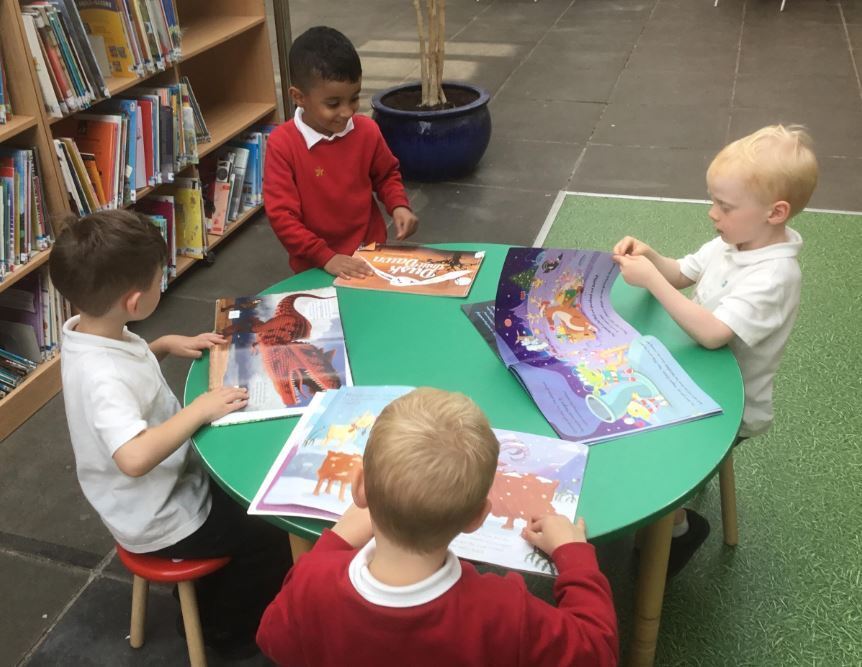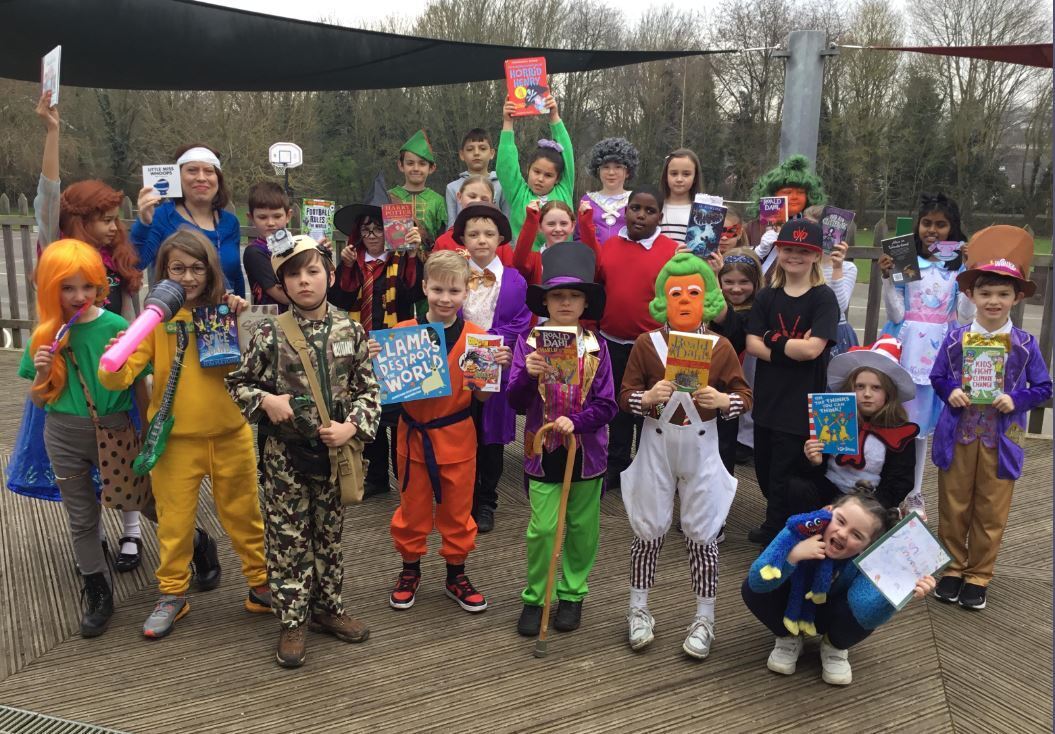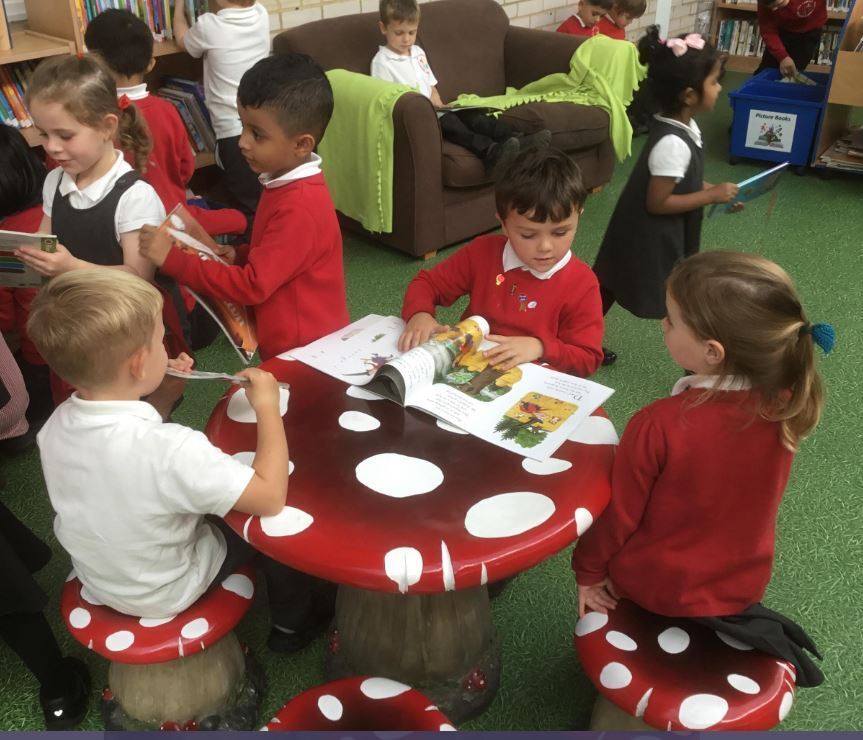English


Reading:
At New Cangle we develop children’s love of reading through a book-led curriculum. We teach units of lessons that are structured around motivating class readers, plays or poems or non-fiction texts.
Whole class reading sessions are taught daily. Teachers model the reading process to the whole class as an ‘expert’ reader. This may involve reading aloud to children, modelling what good readers do, showing children how to pause for punctuation and how to change their voices to make text more meaningful. In EYFS and Y1, when modelling reading, pupils are encouraged to join in (choral reading). In Y2-6, children have access to the text individually. The children follow the text as the teacher reads. The class ‘echo’ read back to practise their fluency and to teach children to recognise and use their ‘story teller voice’ by adjusting their tone/intonation/speed/emphasis when reading. Listening to longer or more complex texts than they would be able to read alone increases children’s knowledge and understanding and, along with the rich vocabulary they encounter, develops their reading comprehension.
Questioning is especially important in reading lessons, at New Cangle we use questioning to promote thinking that leads to deeper understanding. Teachers ask ‘big ding’ questions that prompt fuller responses and that support discussions.
Phonics and Early Reading:
At New Cangle, we believe that all our children can become fluent readers and writers. This is why we teach reading through Little Wandle Letters and Sounds Revised, which is a systematic and synthetic phonics programme. We start teaching phonics in Reception and follow the Little Wandle Letters and Sounds Revised progression, which ensures children build on their growing knowledge of the alphabetic code, mastering phonics to read and spell as they move through school.
As a result, all our children are able to tackle any unfamiliar words as they read. We also model the application of the alphabetic code through phonics in shared reading and writing, both inside and outside of the phonics lesson and across the curriculum. We have a strong focus on language development for our children because we know that speaking and listening are crucial skills for reading and writing in all subjects.
At New Cangle, we value reading as a crucial life skill. By the time children leave us, they read confidently for meaning and regularly enjoy reading for pleasure. Our readers are equipped with the tools to tackle unfamiliar vocabulary. We encourage our children to see themselves as readers for both pleasure and purpose.
Form more information about the teaching of phonics and early reading, please read our Phonics and Early Reading Intent, Implementation and Impact Statement or our Phonics and Early Reading Policy, which can be found here: Policies
Accelerated Reader (AR):
Children in years 2-6 complete a Star Reader Assessment. Following the assessment children are given a ZPD (Zone of Proximal Development). This is an assessment of their reading ability and will generate a reading range at which they are able to read independently. A child’s ZPD is not a reading scheme level and children do not need to work through their ZPD. They are encouraged to choose a text that they are interested in, that is within their ZPD range. Once children have finished reading their book, they take a quiz. 85% is the quiz pass rate. If children are regularly scoring 100% on their quizzes they should be encouraged to either: move up their ZPD; to choose a different genre/author; or to choose a non-fiction text to encourage development and growth.
Writing:
Writing is an essential part of our curriculum offer and of high importance at New Cangle. In EYFS children learn how to hold a pencil correctly and begin to form letters, words and simple sentences. From Year 1, children are introduced to a joined style of handwriting as soon as the child is able to correctly form letters, with the expectation that from Key Stage 1 most will be able to write neatly and fluently.
The teaching of writing in our school stems from a text-led writing approach alongside explicit teaching of spelling, grammar and punctuation. Children will develop the stamina and skills to write at length. They will build on what they have been taught to expand the range of their writing and the variety of the grammar they use. The writing they do will include narratives, explanations, descriptions, comparisons, summaries and poetry. The children are continuously being encouraged to plan, draft and edit their work.
Recommended Apps/Websites:
http://literacyapps.literacytrust.org.uk/category/reading/
https://www.topmarks.co.uk/english-games/7-11-years/spelling-and-grammar
https://www.bbc.co.uk/bitesize/collections/primary-games/1
https://learnenglishkids.britishcouncil.org/fun-games
Reading is led by Mrs Clinch, Phonics by Miss Carter, and Writing by Mrs Shutler.








